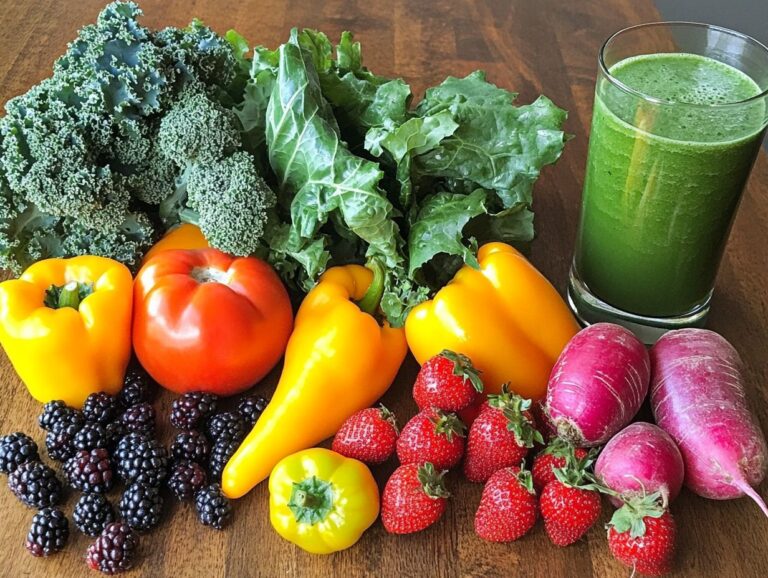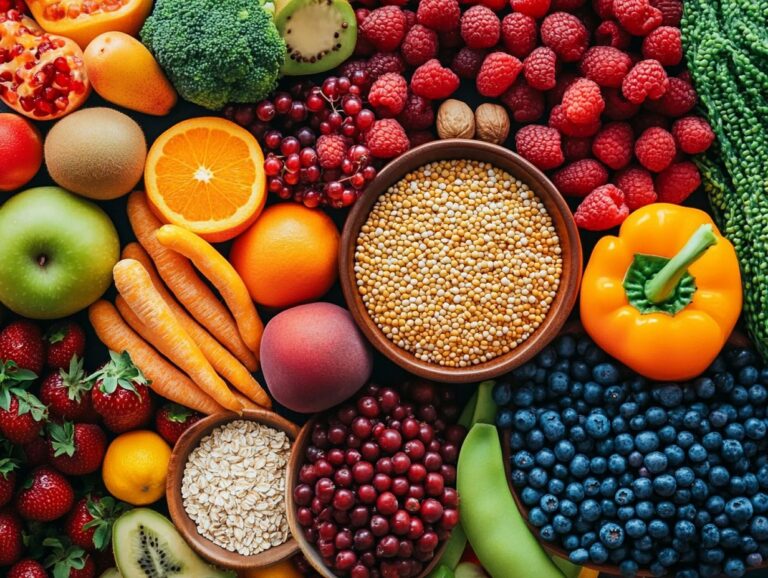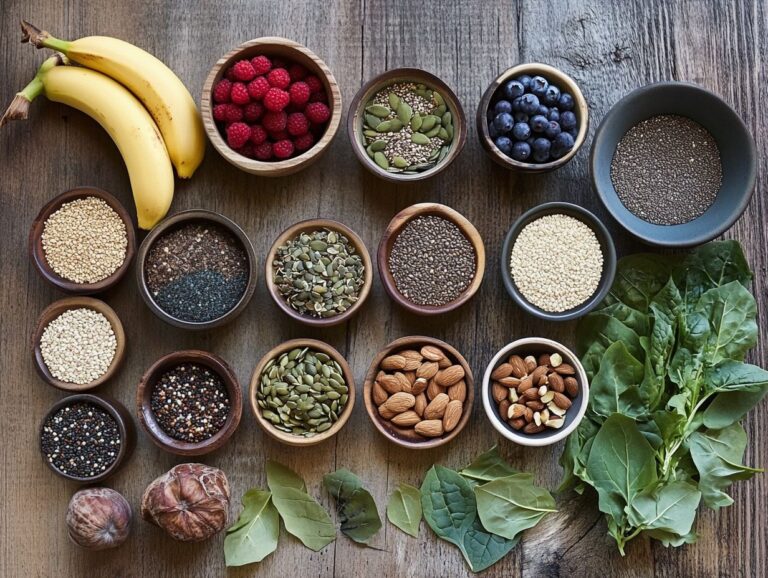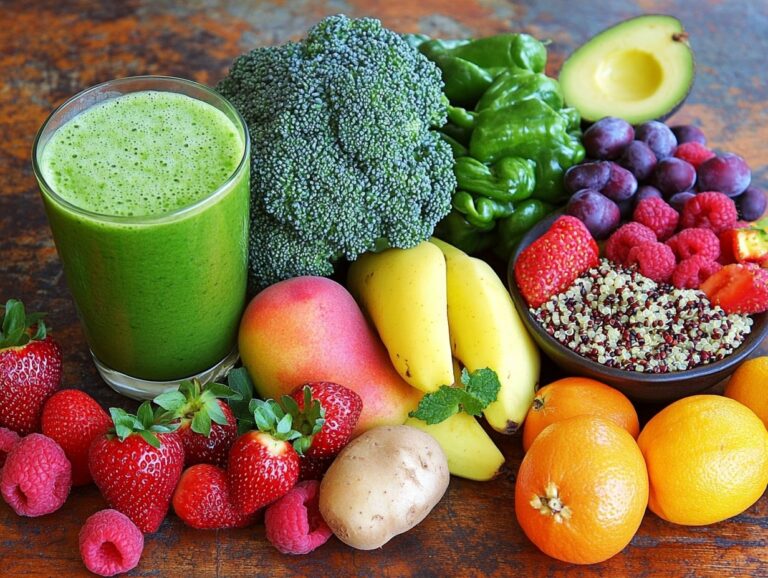This overview provides insight into a vegan diet, covering the definition of plant-based eating, the benefits of weight loss and improved health, the potential drawbacks of a vegan diet, and practical tips for adopting a vegan lifestyle. Whether you are motivated by health, ethical, or environmental reasons, this guide aims to inspire you on your journey toward a vegan lifestyle.
What Is a Vegan Diet?
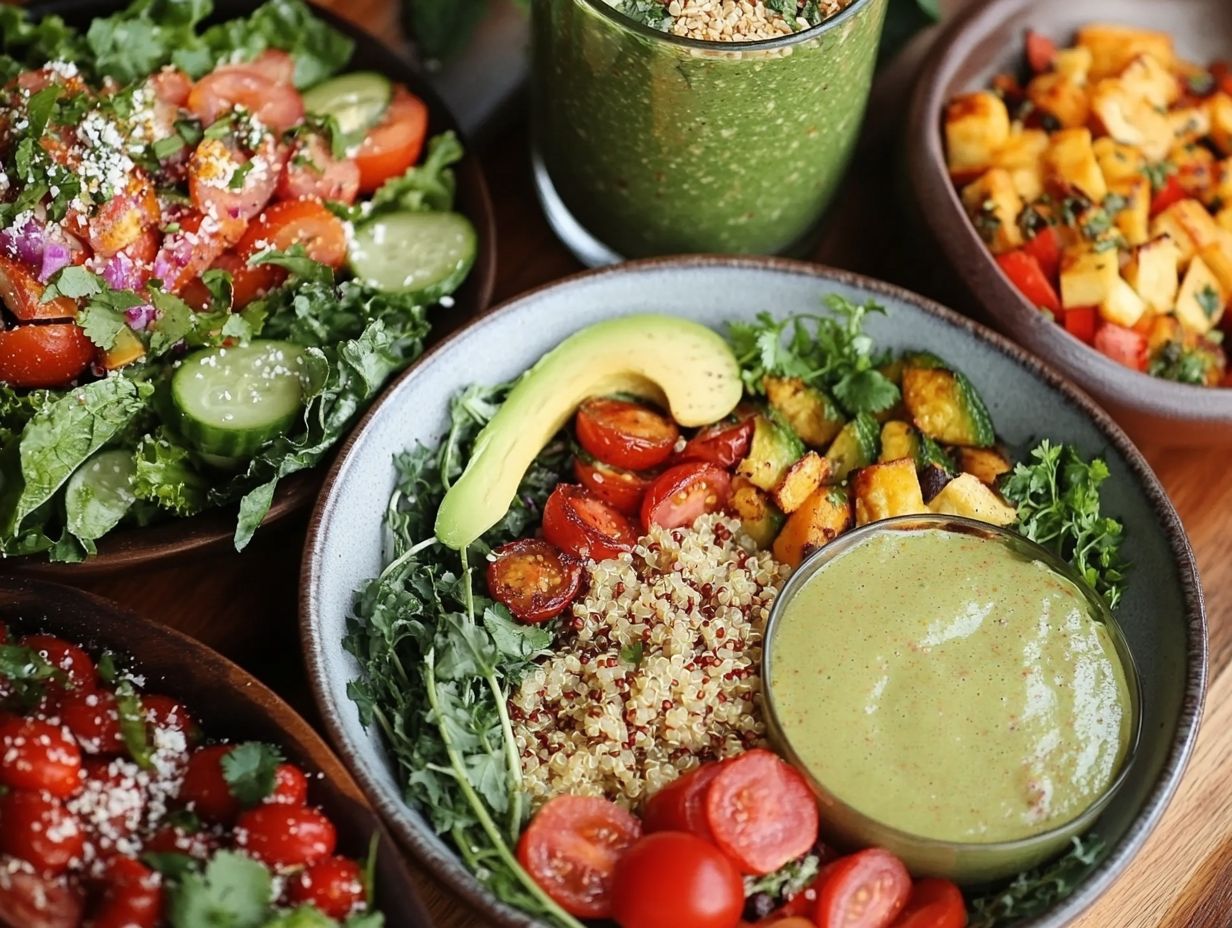 A vegan diet, also known as a plant-based diet, is a dietary regimen that excludes all animal products, including meat, dairy, and eggs, and focuses solely on plant-based foods such as fruits, vegetables, whole grains, legumes, and nuts. This diet not only emphasizes whole foods but also prioritizes nutritional adequacy and sufficient protein sources like legumes and quinoa to maintain a balanced lifestyle. Many individuals choose to adopt a vegan diet to enhance their overall health, promote weight loss, and reduce the risk of chronic diseases. Given its potential benefits for both individual and environmental health, veganism is rapidly gaining popularity.
A vegan diet, also known as a plant-based diet, is a dietary regimen that excludes all animal products, including meat, dairy, and eggs, and focuses solely on plant-based foods such as fruits, vegetables, whole grains, legumes, and nuts. This diet not only emphasizes whole foods but also prioritizes nutritional adequacy and sufficient protein sources like legumes and quinoa to maintain a balanced lifestyle. Many individuals choose to adopt a vegan diet to enhance their overall health, promote weight loss, and reduce the risk of chronic diseases. Given its potential benefits for both individual and environmental health, veganism is rapidly gaining popularity.
What Are the Benefits of a Vegan Diet?
A vegan diet offers several significant health benefits, including weight loss, a lower risk of chronic diseases, and improved nutritional adequacy, as indicated by research from NutritionFacts.org and studies published in the Nutrients publication. Such diets are associated with higher intakes of whole foods, lower calorie density, and greater nutrient content. This makes them an important tool in combating the global obesity epidemic and reducing the incidence of heart disease, type 2 diabetes, and hypertension. Additionally, a plant-based lifestyle promotes environmental sustainability by lowering one s carbon footprint.
1. Weight Loss
Weight loss is one of the most frequently reported benefits of a vegan diet. This is primarily attributed to the low-calorie density of plant-based foods, which allows individuals to consume larger portions while reducing overall calorie intake. Research indicates that meals high in fiber and water content common features of vegan diets stimulate signals of satiety, thereby diminishing the urge to overeat and preventing a caloric surplus. For example, foods like leafy green vegetables, cucumbers, and zucchini are not only low in calories but also nutrient-dense. Many individuals who transition to a plant-based lifestyle report feeling fuller after meals, as evidenced by testimonials on NutritionFacts.org. One man shared his remarkable weight loss journey, explaining how a diet rich in fruits, vegetables, and whole grains enabled him to lose weight while still enjoying generous portions. Additionally, research shows that incorporating beans and legumes can enhance the nutritional value of meals without adding extra calories, underscoring the importance of calorie density in achieving safe and effective weight loss on a vegan diet.
2. Lower Risk of Chronic Diseases
A vegan diet has been linked to a lower risk of chronic conditions, including heart disease, type 2 diabetes, and hypertension, making it a preferred choice for individuals seeking to improve their long-term health outcomes. Studies indicate that those who follow a plant-based diet are less affected by the obesity epidemic and its related complications. Numerous studies have highlighted the protective factors associated with a vegan lifestyle, showing significant reductions in cholesterol levels and better regulation of blood pressure. A systematic review and meta-analysis published in the journal Nutrients found that vegans typically have higher fiber intakes, which are essential for digestive health and disease prevention. By incorporating more whole foods such as fruits, vegetables, legumes, and whole grains, individuals can increase their intake of vitamins, minerals, and other nutrients while also promoting weight loss and reducing inflammation. Avoiding high-calorie density foods, like those found in processed options such as Coca-Cola, is crucial for health and weight management. Additionally, the high concentration of phytochemicals and antioxidants in these foods enhances the body’s ability to combat a wide range of diseases, further contributing to the health benefits of a vegan diet.
3. Improved Gut Health
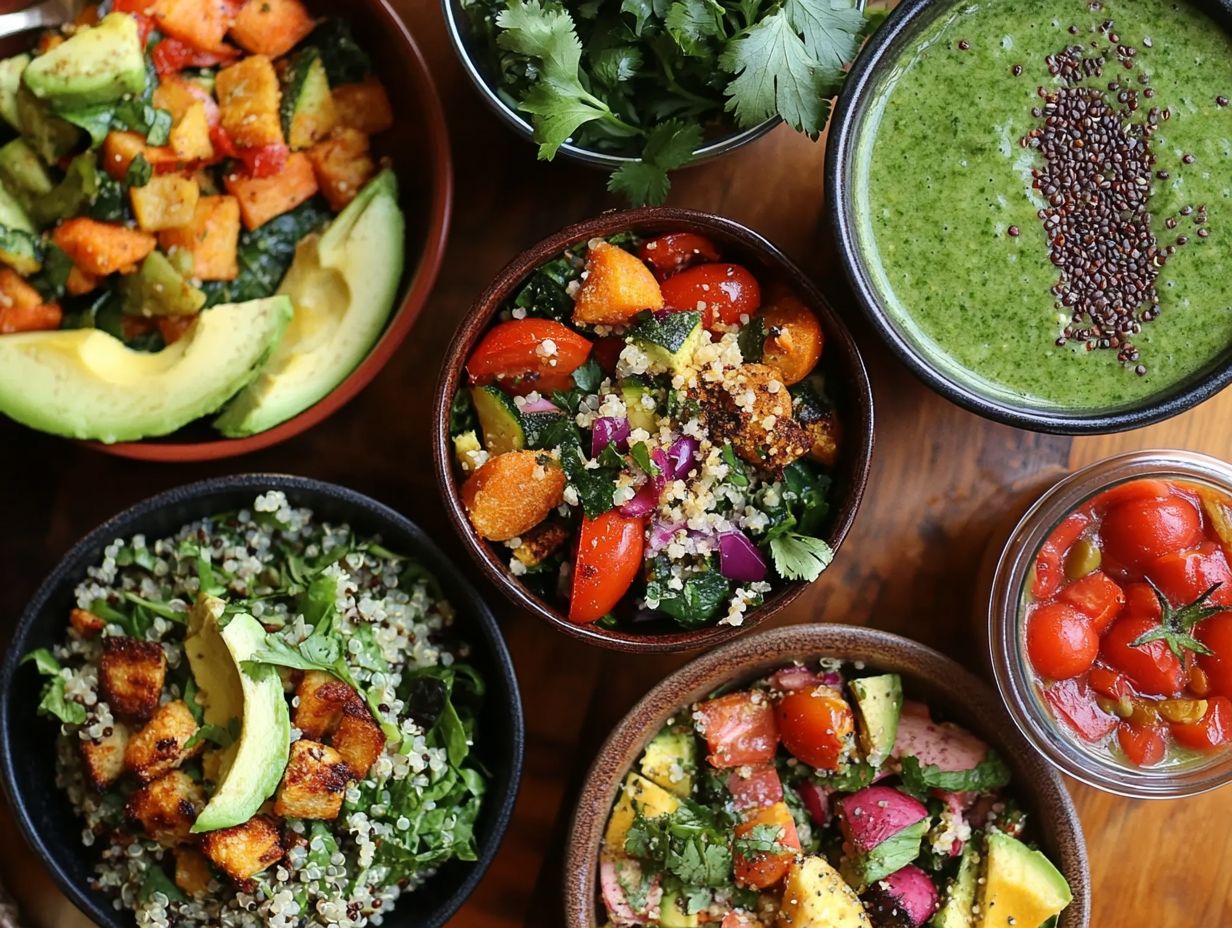 A vegan diet can significantly enhance gut health due to its association with high fiber intake, which supports the growth of beneficial gut bacteria and improves digestion. Foods such as fruits, vegetables, and legumes serve as prebiotic sources, feeding the microbiome and contributing to overall health and well-being. Research indicates that a fiber-rich diet promotes the growth of these beneficial bacteria, leading to improved digestion and a stronger immune system. According to a study published in the journal Nature, consuming a diverse array of plant foods creates a favorable probiotic environment that helps maintain gut flora balance. Nutritionists emphasize that soluble fiber found in beans, oats, and avocados aids digestion and regulates blood sugar levels. By incorporating these foods into their diet, individuals can reduce inflammation and lower their risk of gastrointestinal diseases.
A vegan diet can significantly enhance gut health due to its association with high fiber intake, which supports the growth of beneficial gut bacteria and improves digestion. Foods such as fruits, vegetables, and legumes serve as prebiotic sources, feeding the microbiome and contributing to overall health and well-being. Research indicates that a fiber-rich diet promotes the growth of these beneficial bacteria, leading to improved digestion and a stronger immune system. According to a study published in the journal Nature, consuming a diverse array of plant foods creates a favorable probiotic environment that helps maintain gut flora balance. Nutritionists emphasize that soluble fiber found in beans, oats, and avocados aids digestion and regulates blood sugar levels. By incorporating these foods into their diet, individuals can reduce inflammation and lower their risk of gastrointestinal diseases.
4. Environmental Sustainability
A vegan diet is beneficial for both individuals and the environment, as it reduces personal carbon footprints and decreases resource use in food production. Transitioning to plant-based diets can lower greenhouse gas emissions while also reducing water and land usage. Research indicates that eliminating meat and dairy from one’s diet can halve an individual’s carbon footprint. This is particularly significant, considering that livestock production accounts for an estimated 14.5% of all greenhouse gas emissions, according to the Food and Agriculture Organization. Furthermore, the World Economic Forum reports that plant-based proteins typically require substantially fewer resources; for example, it takes about 1,800 gallons of water to produce just one pound of beef compared to only 600 gallons for one pound of lentils. Studies from Harvard University and the NIH also emphasize the environmental benefits of plant-based diets. Experts suggest that adopting a vegan diet not only promotes individual health but also enhances ecological well-being by improving biodiversity and lessening the strain on the Earth’s finite resources.
How Much Weight Can You Lose on a Vegan Diet?
The amount of weight an individual can lose on a vegan diet varies significantly based on personal dietary choices, adherence to low-calorie density principles, and overall lifestyle habits. While some people may experience rapid weight loss on a vegan diet, it is essential to maintain realistic expectations for achieving sustainable results and promoting overall health.
1. Factors That Affect Weight Loss on a Vegan Diet
Weight loss on a vegan diet is influenced by several factors, including adherence to a balanced diet of whole foods, knowledge of calorie density, and the consistency of dietary practices. Individuals who effectively manage their food choices and portion sizes tend to achieve the best weight loss results. It is essential to prioritize healthy foods such as vegetables, fruits, whole grains, legumes, nuts, and seeds, as these options are more likely to be satiating while remaining lower in calories. Including a variety of these foods also helps protect against nutrient deficiencies and promotes overall well-being. Additionally, lifestyle behaviors such as regular physical activity and mindful eating practices play a crucial role in achieving weight loss goals. Setting attainable objectives and being aware of emotional triggers that lead to overeating can significantly impact long-term success on a vegan diet. Therefore, creating a supportive environment that encourages healthy choices is vital.
2. Realistic Expectations for Weight Loss on a Vegan Diet
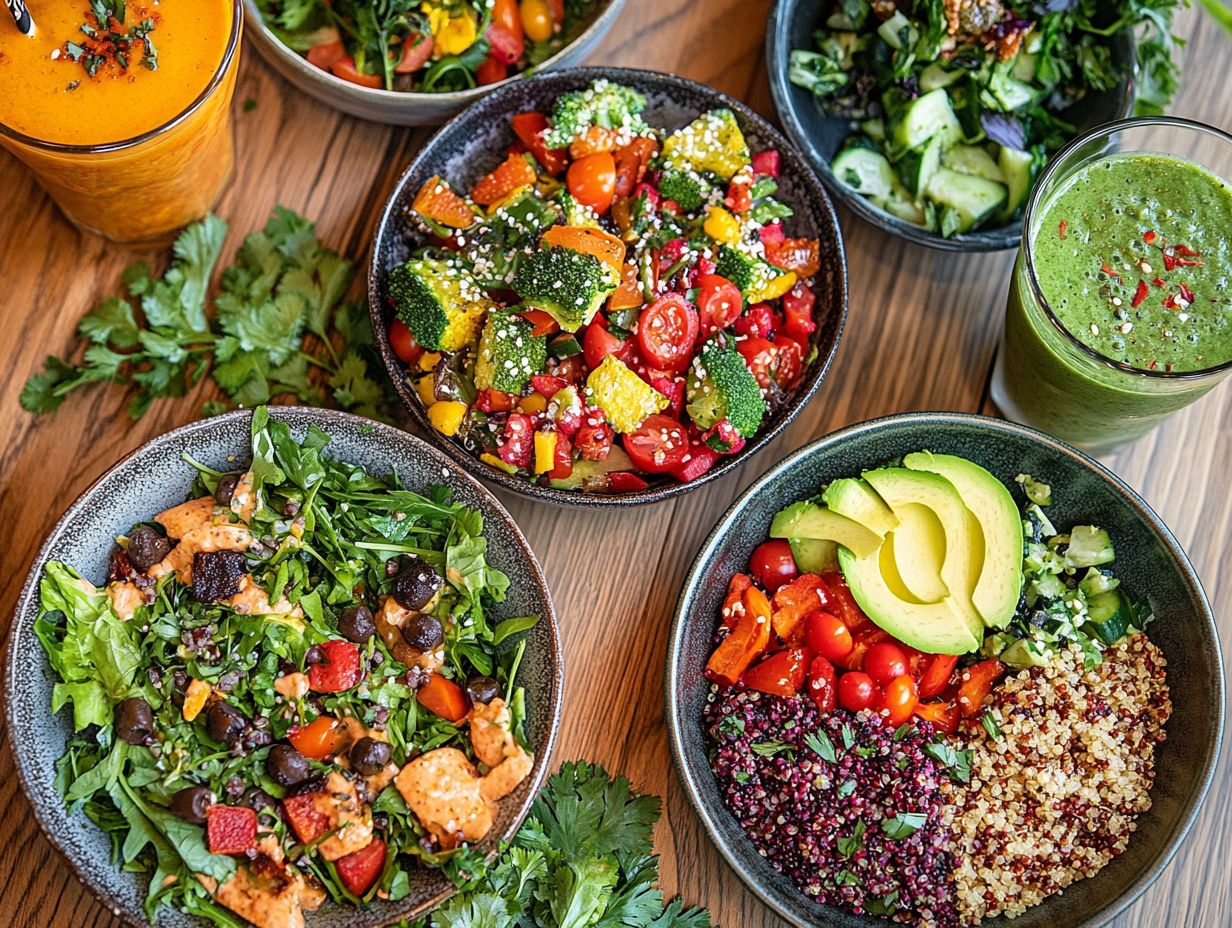 Setting realistic expectations for weight loss while following a vegan diet is crucial for long-term success, as individuals may experience varying rates of weight loss based on their calorie intake and adherence to the diet. Recognizing that weight loss is a gradual process can help individuals avoid discouragement and foster lasting lifestyle changes. A typical timeline might involve a gradual reduction of about one to two pounds per week, which is a healthy and realistic goal. This approach allows the body to adapt to new eating habits while maintaining a positive relationship with food. Consistency is key; making small, incremental changes in diet and exercise often proves to be more effective than adopting rapid, all-or-nothing strategies. Embracing this mindset encourages patience, enabling individuals to not only achieve their desired weight but also maintain it in the long run.
Setting realistic expectations for weight loss while following a vegan diet is crucial for long-term success, as individuals may experience varying rates of weight loss based on their calorie intake and adherence to the diet. Recognizing that weight loss is a gradual process can help individuals avoid discouragement and foster lasting lifestyle changes. A typical timeline might involve a gradual reduction of about one to two pounds per week, which is a healthy and realistic goal. This approach allows the body to adapt to new eating habits while maintaining a positive relationship with food. Consistency is key; making small, incremental changes in diet and exercise often proves to be more effective than adopting rapid, all-or-nothing strategies. Embracing this mindset encourages patience, enabling individuals to not only achieve their desired weight but also maintain it in the long run.
What Are the Potential Drawbacks of a Vegan Diet?
The potential drawbacks of a vegan diet include the risk of nutrient deficiencies, limited food options, social challenges, and the difficulty of maintaining nutritional adequacy. Supplementing with apple cider vinegar and incorporating foods like garlic and cumin can help enhance flavor and nutritional profiles. Although a vegan diet offers numerous health benefits, recognizing these challenges can help individuals better prepare and adapt their diets to mitigate the drawbacks. Incorporating new ingredients like thylakoids, derived from leafy greens, can enhance satiety and further support weight loss efforts.
1. Nutrient Deficiencies
The primary disadvantages of a vegan diet include deficiencies in essential nutrients and a lack of awareness about appropriate food choices. Common deficiencies often involve protein sources, as well as vitamins B12, iron, and omega-3 fatty acids. It is crucial to pay attention to one s diet to ensure a balanced intake of nutrients necessary for good health. To avoid these deficiencies, a wide variety of nutrient-dense foods, including whole grains, should be included in the diet. Additionally, consulting resources from NutritionFacts.org and researchers like Dr. Dean Ornish can provide valuable guidance. For instance, legumes, lentils, quinoa, and chia seeds are excellent sources of protein. Since vitamin B12 is predominantly found in animal products, individuals following a vegan diet should consider fortified foods or supplements to ensure adequate intake. Dark green leafy vegetables, beans, and fortified cereals are good sources of iron, and their absorption can be enhanced by consuming them with vitamin C, which is abundant in citrus fruits. Vegan sources of omega-3 fatty acids include flaxseeds, walnuts, and algae-based supplements. Incorporating whole foods with low-calorie density can support weight loss and nutritional adequacy. Keeping a food diary can also be helpful for tracking overall nutrient intake and identifying areas of deficiency, ultimately aiding in the pursuit of a more balanced and healthful vegan diet. Monitoring water content and fiber intake can enhance satiety signals, aiding in weight management.
2. Limited Food Options
Limited food options present one of the challenges of a vegan diet, particularly in social situations or when dining out, where vegan choices may be scarce. However, recognizing the importance of diverse dietary regimes can help combat the obesity epidemic and reduce the risk of chronic diseases. However, meal planning and preparation are valuable tools that can help provide variety and satisfaction in a vegan lifestyle. By taking a proactive approach, individuals can discover a plethora of delicious plant-based meals, making the vegan experience enjoyable. One effective strategy is to seek out local resources for vegan-friendly restaurants that offer diverse menus, allowing one to dine out without compromising dietary choices. Exploring new recipes can also introduce individuals to unique ingredients and flavors they may have never encountered before. Incorporating seasonal foods into meal preparation helps achieve nutritional balance and adds freshness to everyday dishes. This adaptability not only prevents meals from becoming bland but also fosters a deeper appreciation for the wide range of plant-based foods that can enhance the overall experience.
3. Social Challenges
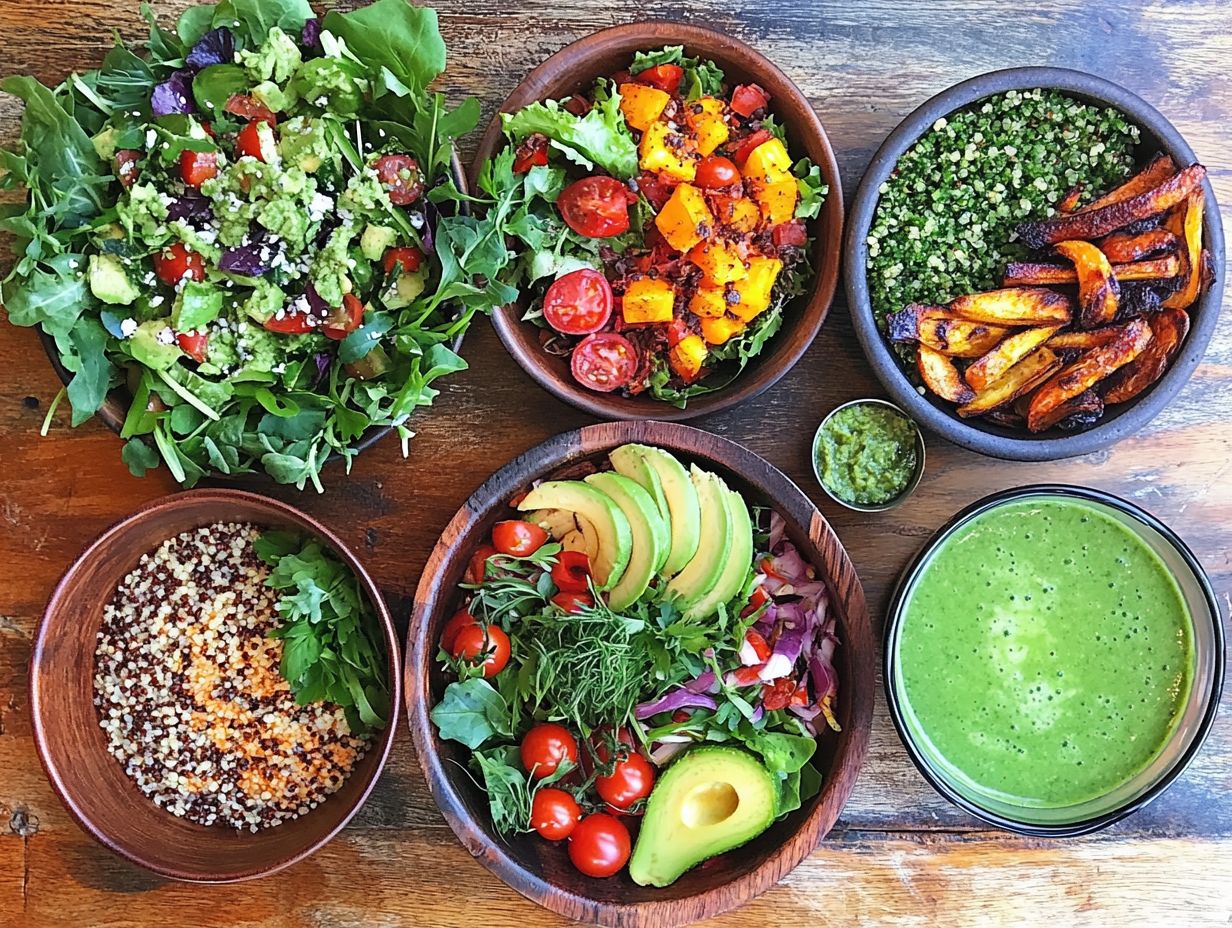 Individuals following a vegan diet often face social challenges, particularly during activities that involve food, such as dining out or attending family gatherings. These difficulties can sometimes be alleviated through careful planning and open communication with friends and family. In some cases, connecting with a network of fellow vegans can provide valuable support and advice on navigating social situations without compromising their dietary choices or values. Common social challenges for vegans include:
Individuals following a vegan diet often face social challenges, particularly during activities that involve food, such as dining out or attending family gatherings. These difficulties can sometimes be alleviated through careful planning and open communication with friends and family. In some cases, connecting with a network of fellow vegans can provide valuable support and advice on navigating social situations without compromising their dietary choices or values. Common social challenges for vegans include:
- Resistance at Home: One of the most prevalent issues is encountering resistance from family members or significant others. For instance, if one partner decides to adopt a vegan diet, they may face challenges from other family members who continue to prepare non-vegan meals. Conversely, a family member who goes vegan might feel uncomfortable eating vegan food in front of non-vegan relatives. To mitigate this challenge, vegans can spend time with supportive friends and family or dine out with other vegans.
- Resistance from Friends: Friends who are unfamiliar with the implications of a vegan diet may feel hesitant or uncomfortable at the thought of their friend eating vegan food. This resistance can create difficulties for someone trying to adhere to a vegan lifestyle.
Strategies for Overcoming Social Challenges as a Vegan: Vegans can alleviate social challenges by planning ahead. For example, they can suggest restaurants that offer vegan options in advance, allowing their friends to prepare for the outing. Additionally, bringing a vegan dish to share at potlucks ensures there is a meal available that aligns with their diet. Joining online vegan communities can also help build a supportive network. These communities can provide encouragement, resources, and tips for enjoying social dining experiences. Establishing open communication with loved ones about dietary preferences is also crucial for navigating social situations successfully.
How to Make a Vegan Diet Work for Weight Loss?
A vegan diet can aid in weight loss when individuals focus on whole plant foods and carefully monitor their intake of healthy fats and protein, as these nutrients promote satiety and ensure nutritional adequacy. Consulting resources like NutritionFacts.org can provide insights into reducing risks associated with heart disease, obesity, and type 2 diabetes. Meal planning can be a useful strategy to achieve this.
1. Focus on Whole, Plant-Based Foods
Consuming whole, plant-based foods is essential for a healthy vegan diet, as these foods are low in calorie density yet packed with nutrients that promote overall health and facilitate weight loss. Including prebiotic foods such as garlic and cumin can further enhance digestive health. Whole foods enhance nutritional adequacy and help individuals feel full with fewer calories. A diet rich in whole foods such as leafy greens, colorful vegetables, whole grains, legumes, nuts, and seeds improves dietary quality and provides vital nutrients, including vitamins, minerals, and antioxidants. Research from Harvard University and the NIH suggests that increasing intake of fruits and vegetables can reduce calorie surplus, aiding in weight management. For example, kale and spinach are excellent sources of iron and calcium, while quinoa offers a complete protein profile. Nutrient-dense whole foods support optimal, healthy weight loss by helping people manage their appetites and consume fewer calories, all while ensuring the body has the energy required for proper functioning.
2. Incorporate Healthy Fats and Proteins
In a vegan diet, healthy fats and various sources of protein are essential for weight loss and maintaining adequate energy levels, as they contribute to overall satiety and nutritional balance. Foods such as avocados, nuts, seeds, and legumes provide important fatty acids and proteins necessary for optimal health. For instance, avocados are a rich source of monounsaturated fats that promote heart health, while nuts and seeds supply omega-3 fatty acids crucial for brain health. Legumes, like lentils and chickpeas, are excellent sources of protein and fiber, helping to keep you feeling full. Additionally, incorporating apple cider vinegar into meals can enhance metabolic rates and support weight loss goals. To incorporate these foods into your daily meals, consider adding avocado to smoothies, sprinkling seeds on salads, or preparing thick soups with beans. Additionally, various types of nut butters can easily be added to overnight oats or whole-grain toast, allowing for the inclusion of healthy fats and proteins without sacrificing flavor.
3. Plan Meals and Snacks Ahead of Time
Planning meals and snacks in advance is one of the most effective strategies for losing weight on a vegan diet. This approach ensures the availability of healthy options and reduces the temptation to resort to high-calorie foods. Following strategies proposed by experts like Dr. Dean Ornish, vegans can effectively manage hypertension and promote heart health. Organized meals give the power to individuals to maintain control over their diets and support their weight loss goals. Effective meal planning strategies, such as batch cooking and pre-portioned snack bags, can significantly enhance the benefits of this approach. Opting for nutritious snacks, such as homemade energy bars or fresh vegetable sticks with hummus, can be instrumental in managing cravings. By regularly scheduling times to prepare meals in advance, individuals can simplify their week, which decreases the likelihood of choosing unhealthy options when time is limited. Additionally, incorporating a mix of whole grains, legumes, and seasonal vegetables not only aids in achieving weight loss goals but also adds variety and interest to meals.
4. Seek Support and Guidance from a Registered Dietitian
Seeking support from a registered dietitian is crucial when pursuing a vegan diet, as these professionals can help ensure nutritional adequacy while also working towards weight loss goals. They address the challenges of vegan nutrition by providing personalized meal plans and dietary advice tailored to individual preferences. Registered dietitians can assist in overcoming obstacles such as cravings or limited food options by developing effective strategies and offering ongoing support and education. They can also advise on the inclusion of thylakoids in the diet for their potential to regulate appetite and support weight management. Consulting a dietitian should be viewed as more than just obtaining a meal plan or nutritional advice; dietitians play a vital role in instilling lifelong habits that promote sustainable weight loss and enhance overall quality of life. Additionally, having the professional support of a dietitian fosters accountability throughout the journey. As highlighted in the Nutrients publication, exploring new approaches to dietary management can lead to sustainable and enjoyable lifestyle changes.
